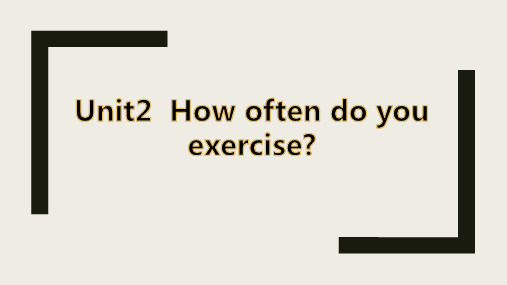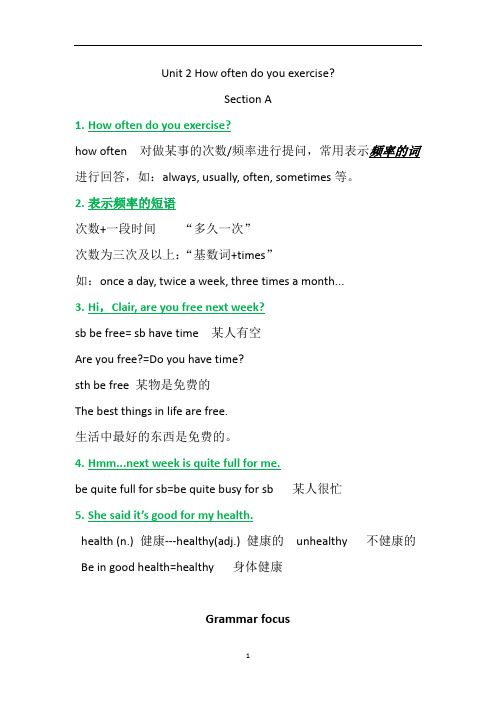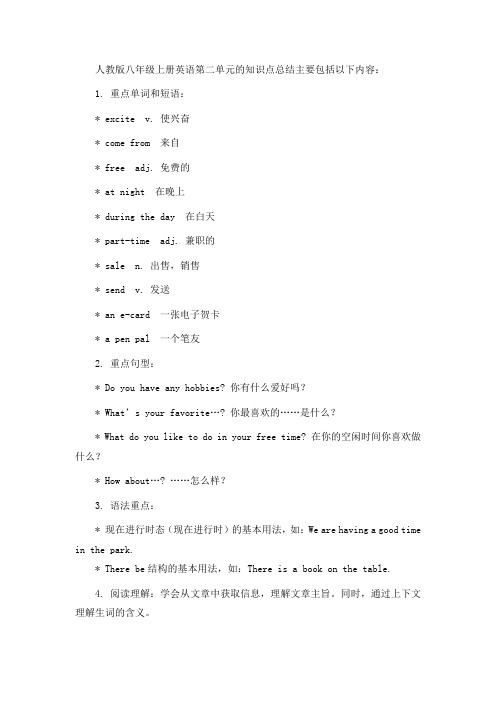人教版八年级上册英语第二单元知识点
八年级人教版英语第二单元 知识点

Unit2 How often do you do exercise?1、主要频率副词的等级排序:always>usually>often>sometimes>hardly ever>never (这些副词在句子中的位置,一般放在助动词do、be动词或情态动词之后)Peter is always late for school.I always do my homework in the evening.提问always,usually,twice a day 等频率副词,用How often1、exercise:(动):锻炼.He exercises every day.(可数名词):“…操,练习”do morning/eye exercise(不可数名词):“锻炼;运动”We often do/take exercise on weekends. 2、go+v-ingSwimming/shopping/skating(滑冰)/fishing/skiing(滑雪)/climbing/hiking3、always=all the time,Sometimes=at times,4、问价格How much=what’s the price of…?询问过多久,多久以后用how soon,回答用“in+时间段”-How soon will he come back?-In an hour.5、free(空闲的)Are you free tonight?;(免费的)work for free;(自由的)a free country6、full“满的;饱的”be full of, The bottle is full of water.“忙的,充实的”=busy, He has a full life.7.be good for:“对……有好处”Doing exercise is good for our health.be good at:“擅长于……”He is good at playing football.be good to sb./sth“对……好”The old woman is goode to us.be good to do sth:“做什么事……有助于;适合”The water is good to drink. be good with:“与……相处好”The teacher is good with his students.8、keep healthy=stay healthy=keep in good health9、ask sb.(not) to do sth.Teacher asked me not to clean the classroom.Ask sb about sth.We asked our students about their free time activities.Ask sb for sth.Ask the teacher for help10、help sb with sth.They help me with this problem.Help sb. (to ) do.They help you (to) solve this problem.11、to one’s surprise令人惊讶的是;in surprise 惊讶地;be surprised at sth 对…感到惊讶;be surprised to do sth惊讶地做某事。
人教版八年级上册英语第二单元知识点复习

■ 5.go skateboarding 去滑滑板 ■ watch TV看电视
■ 如:As teachers, you must believe■ 22.do housework做家务事
that you can make a difference to
the lives of your students.
■ 73.go shopping=do some shopping购物
■ 57.by doing sth.通过做某事
■ 74.spend time with sb.和某人一起度过时光
■ 58.go online去上网
ቤተ መጻሕፍቲ ባይዱ■ 75.spend time/money on sth.在某方面花费
时间或金钱
■ 59.the answer to the question问题的答案 ■ 76.spend time/money (in) doing sth.花费时
查结果
蔬菜
■ 36.hardly= almost not几乎不
■ 51.improve your English 提高你的英语
■ 65.hardly ever几乎从不
■ 52.drink milk 喝牛奶
■ 66.swing dance摇摆舞
■ 53.pretty healthy 相当健康 pretty,adv. 相 ■ 67.go to bed early早点睡觉
■ how many times 多少次 ,用来提
问做某事的次数
■ 9.take more exercise 做更多的运动
■ 16.although=though虽然 <不能与
■ 10.be the same as 与什么相同
八年级上册人教版英语第二单元笔记

八年级上册人教版英语第二单元笔记一、单词与短语1.activity-活动puter-计算机3.magazine-杂志4.conversation-对话5.expensive-昂贵的6.cheap-廉价的eful-有用的eless-无用的9.popular-流行的10.unhappy-不开心的11.expensive-昂贵的12.interested-感兴趣的13.boring-无聊的14.exciting-令人兴奋的15.dangerous-危险的16.safe-安全的17.take part in-参加18.have fun-玩得开心19.learn about-了解20.be good for-对...有好处二、重点句型1.What do you think of...?-你觉得...怎么样?2.I'm not interested in...-我对...不感兴趣。
3.How much does it cost?-它多少钱?4.It's too expensive/cheap.-太贵了/便宜。
5.Can I try it on?-我能试穿一下吗?6.Sure,go ahead.-当然,去试试吧。
7.How do you like...?-你喜欢...吗?8.It's really cool/fun.-真酷/有趣。
9.It's not safe/dangerous.-不安全/危险。
三、重点语法形容词比较级与最高级形容词的比较级和最高级用来表示事物之间的比较。
形容词的比较级一般在原形基础上加-er,最高级一般在原形基础上加-est。
构成规则:1.单音节或部分双音节形容词,在词尾直接加-er(比较级)和-est(最高级)。
-big-bigger-biggest-small-smaller-smallest2.以-e结尾的形容词,在词尾加-r(比较级)和-st(最高级)。
初中英语 人教版八年级上册第二单元知识点

Unit 2 How often do you exercise?Section A1.How often do you exercise?how often 对做某事的次数/频率进行提问,常用表示频率的词进行回答,如:always, usually, often, sometimes等。
2.表示频率的短语次数+一段时间“多久一次”次数为三次及以上:“基数词+times”如:once a day, twice a week, three times a month...3.Hi,Clair, are you free next week?sb be free= sb have time 某人有空Are you free?=Do you have time?sth be free 某物是免费的The best things in life are free.生活中最好的东西是免费的。
4.Hmm...next week is quite full for me.be quite full for sb=be quite busy for sb 某人很忙5.She said it’s good for my health.health (n.) 健康---healthy(adj.) 健康的unhealthy 不健康的Be in good health=healthy 身体健康Grammar focus6.How often的用法how often 用来对表示做某事的频率进行提问,回答时可以用表示频率副词或表示频率的短语进行回答。
如:---How often do you go shopping?(1)---I often go shopping. (频率副词回答)(2)---I go shopping twice a week. (频率短语回答)2.频率副词位置:be之后,动之前。
(be动词之后,Shiite动词之前)频率词及发生概率大小(由大到小):Always, usually, often, sometimes, hardly ever, never(100%--0%) 3.频率短语位置:句尾次数+一段时间如:---How often do you watch TV?---I watch TV twice a week.4.与how相关的短语(1)怎么,怎样。
人教版八年级上册英语第二单元知识点总结

人教版八年级上册英语第二单元的知识点总结主要包括以下内容:1. 重点单词和短语:* excite v. 使兴奋* come from 来自* free adj. 免费的* at night 在晚上* during the day 在白天* part-time adj. 兼职的* sale n. 出售,销售* send v. 发送* an e-card 一张电子贺卡* a pen pal 一个笔友2. 重点句型:* Do you have any hobbies? 你有什么爱好吗?* What’s your favorite…? 你最喜欢的……是什么?* What do you like to do in your free time? 在你的空闲时间你喜欢做什么?* How about…? ……怎么样?3. 语法重点:* 现在进行时态(现在进行时)的基本用法,如:We are having a good time in the park.* There be结构的基本用法,如:There is a book on the table.4. 阅读理解:学会从文章中获取信息,理解文章主旨。
同时,通过上下文理解生词的含义。
5. 写作练习:学会描述自己的爱好、空闲时间活动等,可以通过写日记、邮件等方式进行练习。
6. 听力训练:通过听力材料,提高听力和理解能力,同时学习常用的日常交际用语。
7. 口语练习:通过角色扮演、小组讨论等方式,练习口语表达和交流能力。
8. 文化背景知识:了解不同国家的文化背景和习惯用语,提高跨文化交际能力。
以上是第二单元的主要知识点总结,学生需要重点掌握并熟练运用。
同时,通过大量的阅读、写作、听力和口语练习,提高英语综合运用能力。
八年级上册英语人教版第二单元笔记

八年级上册英语人教版第二单元笔记一、重点单词。
1. housework.- 不可数名词,意为“家务劳动;家务事”。
例如:I often help my mother with the housework.(我经常帮助我妈妈做家务。
)2. hardly.- 副词,意为“几乎不;几乎没有”,本身具有否定意义。
例如:He can hardly speak English.(他几乎不会说英语。
)3. ever.- 副词,意为“在任何时候;从来;曾经”。
例如:Have you ever been to Beijing?(你曾经去过北京吗?)4. once.- 副词,意为“一次;曾经”。
作“一次”讲时,可用于表示频率。
例如:I go to the movies once a week.(我每周去看一次电影。
)5. twice.- 副词,意为“两次;两倍”。
例如:I have read this book twice.(我已经读过这本书两次了。
)6. Internet.- 名词,意为“(国际)互联网;因特网”。
例如:We can get a lot of information on the Internet.(我们能在互联网上得到很多信息。
)7. program.8. full.- 形容词,意为“忙的;满的;充满的”。
be full of = be filled with,意为“充满……”。
例如:The glass is full of water.(杯子里装满了水。
)9. maybe.- 副词,意为“大概;或许;可能”,通常放在句首。
例如:Maybe he is at home.(也许他在家。
)10. swing.- 名词,意为“摆动;秋千”;作动词时,意为“(使)摆动;摇摆”。
例如:There is a swing in the park.(公园里有一个秋千。
)The monkey is swinging from tree to tree.(猴子在树间荡来荡去。
人教版英语八年级上册第2单元笔记

人教版英语八年级上册第2单元笔记一、单元概述本单元主要围绕“学校生活”这一主题展开,通过学习不同场景下的对话和文章,帮助学生了解学校生活,包括课程安排、师生关系、校园活动等方面。
本单元的语法重点包括现在进行时的用法和动词的-ing形式。
二、重点知识点总结1. 现在进行时的用法:(1)基本结构:be + doing,表示正在发生的事情或现阶段正在进行的动作。
(2)用法:a. 经常与now,at the moment等连用。
b. 描述正在发生的事情或现阶段经常进行的动作。
c. 可以用before,when,while等连词连接宾语从句。
(3)举例:I'm listening to the music. (我正在听音乐。
) They're playing basketball now. (他们现在正在打篮球。
)2. 动词的-ing形式:(1)作为动词的现在分词形式,可以在句子中作主语、宾语、表语和定语。
(2)用法:a. 可以表示主动、持续的动作或状态。
b. 可以在句子中表示抽象的概念或情感。
c. 可以用作动名词的替代词。
(3)变化规则:通常在动词末尾加-ing,但是有一些特殊的动词需要特殊变化。
三、课堂笔记1. Section A 1a-1e:(1)重点词汇:subject,class,interesting,boring,enjoy,miss,manage等。
(2)语法:现在进行时态的运用。
(3)听力技巧:a. 听清时间状语,判断正在进行的动作。
b. 注意细节,如人物的动作和情感。
c. 在听对话和小组讨论时,要注意说话人的语气和语境。
(4)口语表达:练习用现在进行时态描述自己的学校生活和同学之间的互动。
2. Section B 2a-2e:(1)重点词汇:exciting,funny,relaxing,impressive等。
(2)语法:动词-ing形式的用法。
(3)阅读技巧:a. 快速浏览文章,了解主要内容和结构。
人教八年级英语上册第2单元知识点总结归纳

Unit2 How often do you exercise?【重点语法】1. 频率副词: always, usually, often, sometimes, never频率副词在句中通常放在实义动词之前, be动词或助动词之后。
常用于一般现在时态中。
2.“次数”的表达方法一次 once,两次twice,三次或三次以上:基数词+ times, 如:three times, five times,3. how often“多久一次”问频率,回答常含有频率词组或短语。
常见的how疑问词:1)How soon 多久(以后)—How soon will he be back?他多久能回来?—He will be back in a month. 他一个月后能回来。
2)how long “多久”—How long did it take you to clean the house? 你打扫房子用了多久?—It took me half an hour to clean the house. 我打扫这房子用了半小时。
3)How many+名复How much+不可名“多少”问数量(how much 还可问价格)【重点短语】1. go to the movies 去看电影2. look after = take care of 照顾3. surf the internet 上网4. healthy lifestyle 健康的生活方式5. go skate boarding 去划板6. keep healthy=stay healthy 保持健康7. eating habits 饮食习惯8. take more exercise 做更多的运动9. the same as 与什么相同10. be different from 不同11. once a month一月一次12. twice a week一周两次13.make a difference to 对......有影响/作用14. most of the students=most students15. shop=go shopping=do some shopping 购物16. be good for 对......有益17. be bad for 对......有害18. come home from school放学回家19. of course = certainly = sure 当然20. get good grades 取得好成绩21. keep/be in good health 保持健康22. take a vacation 去度假【词语辨析】1. maybe / may bemaybe 是副词,意为“大概,可能,或许”,一般用于句首。
- 1、下载文档前请自行甄别文档内容的完整性,平台不提供额外的编辑、内容补充、找答案等附加服务。
- 2、"仅部分预览"的文档,不可在线预览部分如存在完整性等问题,可反馈申请退款(可完整预览的文档不适用该条件!)。
- 3、如文档侵犯您的权益,请联系客服反馈,我们会尽快为您处理(人工客服工作时间:9:00-18:30)。
Unit2 How often do you exercise?一、重点短语1.look after = take care of 照顾2. surf the internet 上网3.healthy lifestyle 健康的生活方式keep healthy=stay healthy 保持健康 5.eating habits 饮食习惯 6.take more exercise 做更多的运动7.the same as 与什么相同8.be different from 不同9.once a month 一月一次10.twice a week 一周两次11.make a difference to 对什么有影响12.most of the students=most students 大部分学生13.shop=go shopping=do some shopping 购物14.be good for 对什么有益15.be bad for 对什么有害e home from school 放学回家17.of course = certainly = sure 当然18.get good grades 取得好成绩19.keep/be in good health 保持健康20.take a vacation 去度假21.help with housework 帮助做家务22.on weekends 在周末23.how often 多久一次24.hardly ever 几乎从不25.every day 每天26.be free 有空27.go to the movies 去看电影e the Internet 用互联网29.swing dance 摇摆舞30.play tennis 打网球31.stay up late 熬夜;睡得很晚32.at least 至少33. go to bed early 早点睡觉34.such as 比如;诸如35. have dance and piano lessons 上舞蹈课和钢琴课36.play sports 进行体育活动37. go camping 去野营38.not…at all 一点儿也不…… 39.i n one’s free time 在某人的业余时间40.the most popular 最受欢迎的41.old habits die hard 积习难改42.go to the dentist 去看牙医43.morn than 多于;超过44.less than 少于二、习惯用法1. What’s your favorite……? 你最喜爱的…… 是什么?2. How about…? ...... 怎么样?/ …… 好不好?3.How many+ 可数名词复数+ 一般疑问句?…… 有多少……?4. 主语+find+that 从句. …… 发现……5.. by doing sth. = through + 名词通过做某事6. help sb. with sth. 帮助某人做某事7. spend time with sb. 和某人一起度过时光8. want sb. to do sth. 想让某人做某事9. It’s+ adj.+ to do sth. 做某事的…… 的。
10. ask sb. about sth. 向某人询问某事11. the best way to do sth. 做某事的最好方式三、词语辨析:1. how often 多久一次,用来提问动作发生的频率。
回答用:once ,twice, three times 等词语。
How often do you play sports? Three times a week.how long 多长,用来询问多长时间,也可询问某物有多长。
How long does it take to get to Shanghai from here? How long is the ruler?how far 多远,用来询问距离,指路程的远近。
回答或具体公里数,或30 minutes’ walk / drive…How far is it from here to the park? It’s about 2 kilometers.2. free 空闲的,有空的,反义词为busy. be free 有空,闲着,相当于have time.I’ll be free next week. = I’ll have time next week.还可作“ 免费的、自由的” 解。
be free to do sth. 自由地做某事。
The tickets are free. You’re free to go or to stay.3. How come ?怎么会?怎么回事?表示某件事情很奇怪,有点想不通;可单独使用,也可引导一个问句,相当于疑问句why, 但how come 开头的特殊疑问句使用的仍然是陈述语序。
How come Tom didn’t come to the party? = Why didn’t Tom come to the party?4. stay up late 指“ 熬夜到很晚,迟睡” 。
Don’t stay up late next time.stay up 指“ 熬夜,不睡觉” 。
He stayed up all night to write his story.5. go to bed 强调“ 上床睡觉” 的动作及过程,但人不一定睡着。
I went to bed at eleven last night.go to sleep 强调“ 入睡,睡着,进入梦乡” 。
She was so tired that she went to sleep soon.6. find + 宾语+ 名词, 发现:We have found him (to be) a good boy.find + 宾语+ 形容词,发现:He found the room dirty.7. percent 百分数,基数词+ percentpercent 没有复数形式,作主语时根据所修饰的名词来判断谓语的单复数。
Forty percent of the students in our class are girls.Thirty percent of time passed.8. more than 超过,多于,不仅仅,相当于over. 在句型转换中考查两者的同义替换。
反义词组为:less than.I lived in Shanghai for more than / over ten years.9. afraid 形容词,担心的,害怕的,在句中作表语,不用在名词前作定语。
I’m afraid we can’t come here on time.be afraid of sb / sth 害怕某人/ 某事;be afraid of doing sth. 害怕做某事。
Some children are afraid of the dark. Don’t be afraid of a sking question.I’m afraid + 从句,恐怕,担心:I’m afraid I have to go now.10. sometimes , sometime, some times , some time 的区别:sometimes 频度副词,有时。
表示动作发生的不经常性,多与一般现在时连用,可位于句首、句中或句末。
(How often 提问)Sometimes I get up very early. ------How often do you get up?sometime 副词,某个时候。
(When 提问)表示不确切或不具体的时间,常用于过去时或将来时,对它用疑问词when.I will go to Shanghai sometime next week. ------When will you go to Shanghai next week?some times 名词词组,几次,几倍。
其中time 是可数名词,(how many times 提问)I have read the story some times. -------How many times have you read the story?some time 名词短语,一段时间. 表示“ 一段时间” 时,句中谓语动词常为延续性动词,(How long 提问)I’ll stay here for some time. -----How long will you stay here?11. 频率副词: always, usually, often, sometimes, never频率副词在句中通常放在实义动词之前, be 动词或助动词之后。
常用于一般现在时态中12.“ 次数” 的表达方法一次once ;两次twice ;三次或三次以上用基数词+ times13. As for homework , most students do homework every day .as for... 意思是“ 至于;关于” ,+ 名词、代词或动词的-ing 形式(即动名词)。
如:As for him ,I never want to see him here. 至于他,我永远不希望在这里见到。
As for the story ,you'd better not believe it. 关于那故事,你最好不要相信。
14. That sounds interesting.这是“ 主语+ 系动词+ 表语” 结构的简单句。
sound (听起来),look (看起来),smell(闻起来),taste (尝起来),feel (觉得),seem (好象),grow (变得),get(变得)等词在英语中可用作系动词,后跟形容词作表语。
如:It tastes good. 这味道好。
The music sounds very sweet. 这音乐听起来很入耳。
The smoke grew heavier and heavier. 烟雾变得越来越浓了。
15. Be about (介词)“ 是关于…”+ 名/ 代/V-ing16.however 副词,意为“ 然而,可是” ,表示转折关系,可放在句首、句中、句末17.not … at all 意为“ 一点也不”. not 应放在be 动词、情态动词或助动词之后。
即否定句+ at alle.g. The story isn’t interesting at all. 那个故事一点也没有趣。
